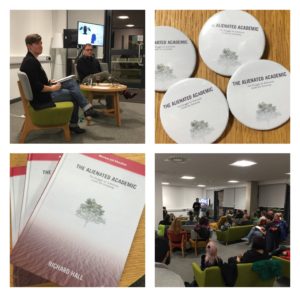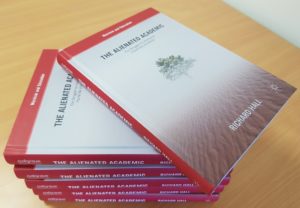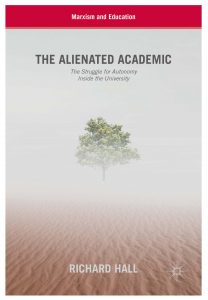There has been so much discussion of potential job losses across institutions; there has been so much discussion of how negotiations over the USS Pension Scheme will play out; there has been so much discussion of the impacts of the ONS review of the decision of how to treat student loans in the public accounts; there has been so much discussion of the impact of the Augar Review of post-18 education. There has been so little discussion of what this means politically for academic labour.
That isn’t to say that there has not been an on-going statement of how academic work is adversely, toxically, negatively disassembling what it means to be human inside the University. For instance, a recent tweet from an academic at Leeds, liked almost 5,200 times, points to the impact on mental health of the apparent disregard that management have for their academic labourers.
Only, in the thread that follows, academics are not regarded as labourers, rather their fetishised status as privileged knowledge workers takes on the usual, depressing and reified narrative in which individuals who have worked for doctorates are commodified as assets. This represents an ongoing failure to engage with the political economy of academic work, and to see it for what it is: the everyday, coercive re-sale of alienated labour-power, which results in the everyday estrangement of the individual from herself and her community. This community includes the students whom she must sort and separate and grade, her peers against whom she must compete for status and privilege and resources, and her Commons whom she must use as an asset or develop as a market for knowledge transfer or exchange.
Describing the depressive position of academic life is one thing; analysing and moving beyond it demands socially-useful theory, rooted in the ongoing reproduction of alienating capitalist social relations. Academic impact and the public good are socially-useful for capital, and demand a different kind of analysis. Instead praxis demands that rather than fetishising academic labour, we see it for what it is – brutally alienating. As Ansgar Allen wrote in his review of The Alienated Academic, my argument is a:
critique of the academic’s number one fetish: their own world-historical importance, its role in their enslavement to a work ethic built on alienation, and their participation in wider flows of capitalist destruction. Though many in the academy may think otherwise: another world is not possible, at least not a world that issues from the labour of the current academic, however radically inclined.
Thus, my opening chapter focuses upon the academic labourer becoming awakened.
This is a book about estrangement and alienation in academic life; about being a stranger to the nature of your own scholarly work, to yourself and to your peers. This is a book about moving beyond the surface perception of academic work as a labour of love or privilege, in order to understand its essence inside increasingly alienating contexts.
Hall, R. 2018. The Alienated Academic: The Struggle for Autonomy Inside the University. London: Palgrave Macmillan, p. 1.
In expanding upon this idea that work is a withering form of living death rooted in personal losses, and that academia is not privileged and that it is not a labour of love and that in the process of fetishising it we diminish ourselves, I argue that this stops us from seeing the inability of the University to address global emergencies.
Proletarianisation renders institutions hopeless spaces for addressing the wider ramifications of the crisis of value. The University framed by a secular crisis of the value-form remains unable to address fundamental global problems like climate change, because its interaction with the world is mediated through the market, the division of labour and commodity-exchange.
It is increasingly unclear how these institutions and their curricula enable global societies to adapt through collective, educational repair. This is precisely because HE institutions are limited to their ability to coerce individuals in placing their labour-power for sale in the market.
ibid., p. 57
This idea that academics fetishise and universalise their own labour as an objective, public good does nothing but cripple any hopes of self/social-care or renewal.
Academics have been nudged towards accepting these forms of crippling enslavement by focusing upon the alleged privilege of working in education, and the self-sacrifice of public service. This has been a way in which capital has been able to compel overwork and exhaustion across a social terrain… Estrangement from the self emerges from the loss of subjectivity and sensuous, creative practice, inside relations of production with increased technical composition.
As a process of reproduction the labour process forms a motive power underpinning the expanding circuit of alienation, A-A’. This expansion shapes subjugation, because the potential of the labour-power inside each individual labourer cannot be realised except through the objective conditions of capitalist work for value.
Ibid., p. 169
The question is then possibly Lenin’s, what is to be done? Or perhaps Nietzsche’s what next? Later in the book, I argue that individual academics must confront alienating conditions of work that reproduce estrangement across social and personal terrain, at the level of society.
As a growing surplus population drags the experience of exploitation and immiseration from the margins of academic society into its core, through performance management and precarious employment, there is potential for indignation and degradation to be generalised. At issue is how to place transformation of the mode of production at the heart of the matter, rather than amplifying hopelessness. As practices from the racialised, gendered, disabled, homosexual and queer margins of the global North and the global South move back to the centre of production, engagement in survival programmes as a precursor to dismantling the mode of production, are crucial for academics. Academic privilege and hegemonic, alienating academic norms need to be checked by learning from alternative life experiences. This demands a new war of position in the name of survival pending revolution, rooted in co-operation and accepting of the reality that Keynesian, welfare capitalism cannot be reinstalled. Instead, academic hopelessness needs to stimulate an alternative social function as the basis for abolishing wage labour.
Ibid., p. 181
It is not enough to discuss academics as a homogenous group or with an ability to work collectively to confront their conditions of production, in order to challenge the relations of production that are so clearly toxic to so many. It is clear that academics exist in a range of constantly shifting, determinate conditions, which are re-shaping the ways in which academic labour functions through the application of new forms of organisation, precarious employment, rounds of voluntary severance and reorganisation, the imposition of new technologies, policy edicts which drive competitive demands, and so on.
Moreover, these conditions are different for a range of sub-groups and communities of whatever academia is or might be. Where the experience is defined by norms set against the idea of the successful White, male, heterosexual, able Professor, the rest of the academic peloton is forced to recalibrate itself will be recalibrated by this privilege. What this then means if you are an academic of colour, female, have a caring responsibility, are ill, whatever, is that you have to suck it up or take that next course on mindfulness or resilience, or decide that perhaps this isn’t the place for you.
This means that uncovering political composition needs more attention by academics as they try to work for solidarity and collective action. This composition is effectively the ways in which labour organises and resists the labour process itself, in part generated through struggles over pensions or workload or whatever, and which is aimed at refusing the imposition of a new technical composition of capital across the terrain of academic work, which can only ever aim at reproducing exploitation. This technical composition is the ability of capital to annihilate the costs of labour-power whilst enforcing productivity gains or longer working hours upon those who remain. It is no wonder that we see an increase in the academic gig-economy, increasingly technological performance management, a rise in the reserve army of PhD labour with no apparent future, and a narrative that fetishises human capital development with the risk owned by the individual academic.
Of course, one of the issues here is that labour-power is the source of value inside capitalism, and so by annihilating labour capital undermines itself though a crisis of profitability. Yet in order to overcome the political composition of labour, capital has constantly to innovate its technical composition. Is it possible then to use this as a moment to challenge alienating work? Is it possible to analyse the political composition of academic labour, in order to refuse a technical recomposition designed to extend the universe of value?
The theory of class composition restates the problem of power in a perspective where recomposition is not that of a unity, but that of a multiplicity of needs, and of liberty.
Negri, A. (1979). Marx Beyond Marx: Lessons on the Grundrisse. London: Pluto Press, p. 14.
The problem with not being able to do this analytical work, is that the academic has no starting point for refusal, other than a lamentation or a scream against the latest indignity. One result is that there may be anger, but there can be no indignation. For whilst Marx argued that the individual worker would only ever become “an appendage” and mutilated or fragmented, with her family thrown under the juggernaut of capital acting as a werewolf or a vampire, too many academics still cling to the ideas of status and privilege are themselves underpinned by hope rather than hopelessness. This means that there can only be space for anger rooted in powerlessness at the latest excellence framework or demand for impact or research audit or student evaluation or workload plan. And anger rooted in powerlessness leads to a depressive position.
And so the question becomes how to decompose academic labour. How do academics analyse their own social organisation in relation to capital? How do they unpack the conditions and relations of production, where they are employed inside the University acting as a means for the production of value, in concert with transnational finance capital, global educational technology/publishing firms underwritten by venture capital, and policymakers working in partnership with transnational bodies like the World Bank or IMF, and where their work is conditioned by student debt? It is important that this work is done, because the particular situation of the academic is her starting point for analysing the lack of solidarity amongst academics as a group, and for realising the relative solidarity between sub-groups of academics who continue to be made marginal inside the system of hegemonic production. Moreover it is a starting point for realising the relative solidarity between subgroups of academics and a movement beyond the University of groups and individuals made marginal.
Here, class is not enough. As a result, it is important to look at the differential conditions of labour for: Professors; tenured staff; professional services staff; students; postgraduate teaching assistants; precariously employed staff; and to do this in terms of gender, ethnicity, sexuality, disability and so on. Because it is clear that in order to leverage change inside the Academy, as a moment of prefiguring change outside the Academy, or perhaps where change inside the Academy is immanent to change outside, some people have too much to lose. Too much privilege, too much status, too many resources, and for some, the process of proletarianisation has not impacted enough to spark their solidarity.
It is the proletariat who, for Marx, with a revolutionary class, and the potential for change then stems from those (academics) with nothing left to lose. This means that such a workerist analysis of the condition of academic work needs to consider how that work is integrated into capitalist social relations and relations of production. It needs to consider the divisions that exist between academics, and how those divisions or separations are maintained. This includes disciplinary separations reinforced through league tables and excellence frameworks, as well as separations of status and privilege.
Moreover, such a(n academic) workers’ enquiry might connect academic labour to the idea of autonomous activity outside the University and whether they offer moments of subversion or transgression against the value-relation. Do they enable hegemonic social relations to be subverted? Moreover, is there space for decomposing academic labour, such that the divisions noted above might be dissolved as a stage in moving towards the abolition of that labour, rather than its fetishisation and accompanying hopes that a Utopian state can be restored? Instead, this recognises that academic labour, like all other forms of labour, is not privileged. It is always in a process of being dominated, exploited, reengineered and repurposed for-value, as capital struggles to annihilate its own dependency upon labour-power. This demands that academics see their conditions of labour as continually-changing, and that the only redemption lies in accepting the hopelessness of a compact with a system of exploitation.
The power therefore lies in attempting to see that individuals working collectively makes the world, and need to be alive to both its historical and current, material realities, in order to develop new forms of struggle. Capital’s ongoing struggle to decompose and recompose academic labour means that there can be no Happy New Year, in which a system of exploitation governed through competition and mediated through private property (in the form of knowledge), the division of labour, commodity-exchange and the market, is given away by those with power-over us. There will be no Happy New Year, which is better for our fragmented physical and mental health, precisely because just like the old year, the New Year will be built upon alienated labour-power. Understanding the political economy of academic work is a starting point for establishing our own power-over the world, our own weaknesses, our own associations and spaces of solidarity, such that we might decide what next or what is to be done?
However, this cannot be disaggregated from wider struggles in the world to decolonise, or for gendered rights, or for disability rights, or for environmental rights, or for whatever. This means that different forms of organisation might be needed inside the University and beyond, which also recognise the historical and social specificity of those contexts, whilst working towards dissolving the boundaries between them. This dissolution is the recognition by the academic that she is a socialised worker, and that in this dissolution lies her ability for self-actualisation as a form of self-mediating activity not conditioned by competition, excellence, impact, entrepreneurship, employability, the market, whatever.
If you have no engagement with political economy, good luck with that, because the system wishes to reduce you to your alienated labour-power. And what is worse, it wishes to annihilate the value of that labour-power in every moment of every day, through competition with others on your administration, teaching, assessment, scholarship, research, public engagement, impact, excellence, unemployability, and it wishes to do this transnationally. It is no wonder that your physical and mental health is fragmented, commodified, made toxic.
labour increasingly struggles to be integrated into a global, alienating, social metabolic control, with ramifications for domination and subordination. Thus, a primary aim for revolutionary practice rooted in revolutionary pedagogy is not simply to overthrow capital, but to abolish it as the means of regulating society.
The critical moment for alienated academic labour, is to treat the University as context for radical research that might produce living knowledge capable of revolutionary practice at the level of society (Roggero 2011). It has no revolutionary moment beyond this position, and instead can only act for the recuperation and reproduction of the capital relation. An academic, workers’ enquiry is a departure point for enabling ‘the worker to develop the capabilities of [her] species’ (Marx 2004, p. 447), which will dissolve the capitalist mode of production inside a new, non-alienated mode.
Without such a theorisation it becomes impossible to negate the capital-relation through the expansion of the realm freedom and autonomy. Instead, the focus becomes about issues of free speech, academic autonomy, resistance to casualisation, and other tactical reforms of an otherwise brutalising system. [Revolutionary praxis] entails a focus upon the production of the self as a pedagogic moment grounded in self-mediation as the key organising principle for life.
Ibid., pp. 232, 234, 248
Merry Christmas.


